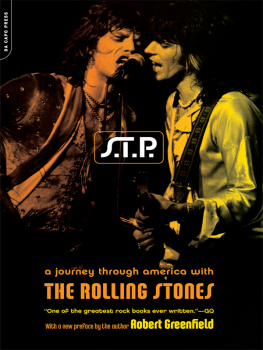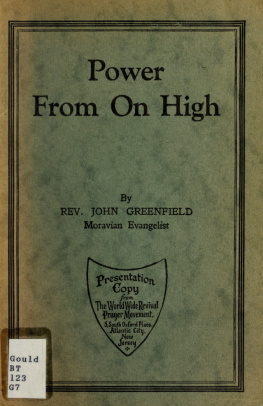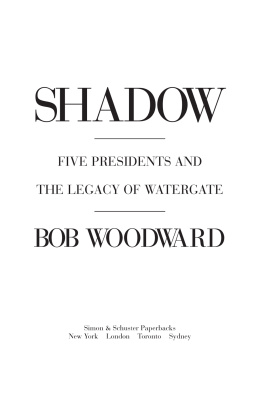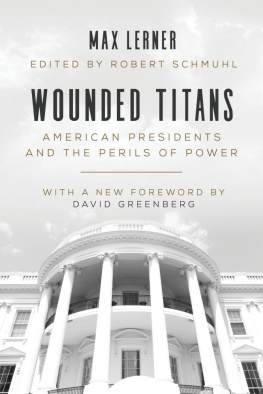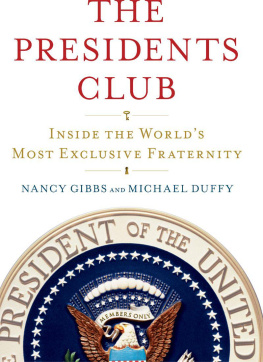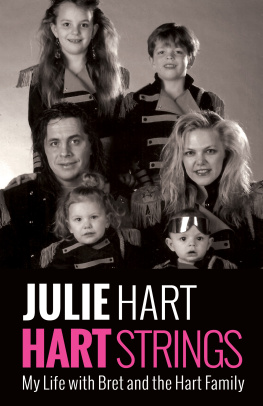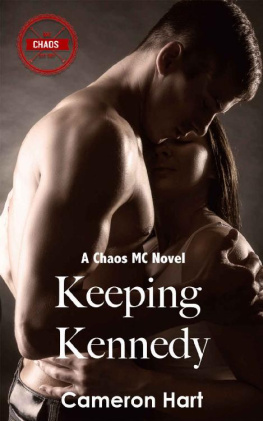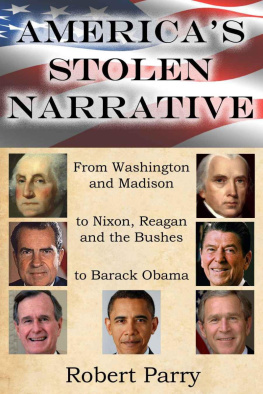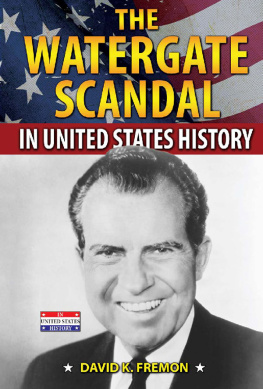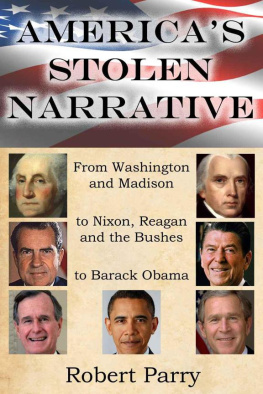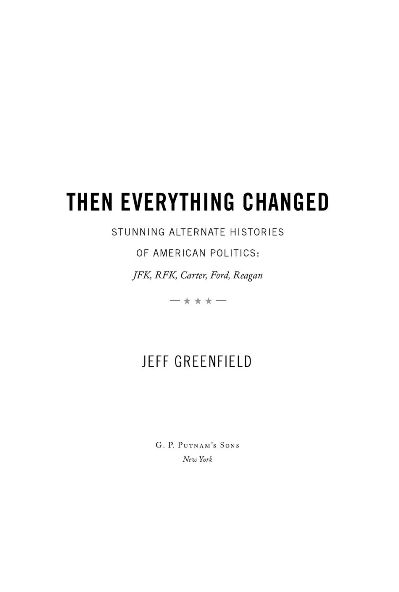Table of Contents
ALSO BY JEFF GREENFIELD
NONFICTION
The Advance Man (with Jerry Bruno)
A Populist Manifesto (with Jack Newfield)
No Peace, No Place: Excavations along the Generational Fault
The Worlds Greatest Team
Television: The First Fifty Years
National Lampoons Book of Books
Playing to Win: An Insiders Guide to Politics
The Real Campaign
Oh, Waiter! One Order of Crow!
FICTION
The Peoples Choice
To my children, Casey and Dave
Preface
A SIMPLE TWIST OF FATE
On February 13, 1933, a man with a loaded pistol set out for Miami Beachs Bayfront Park, where a public event was in progress. Because he arrived a few minutes later than he had planned, he found his access to the event blocked by a crowd of people. So he climbed on a chair and pulled out his weapon, catching the attention of a spectator, who jostled him as he prepared to fire. So Giuseppe Zangara did not kill President-elect Franklin D. Roosevelt, who went on to lead the United States through the Great Depression and World War II.
What would have happened if FDR had not been able to steer his country through some of its most dangerous times? The United States would have been led by John Nance Garner, a Texas conservative whose political inclinations make the idea of a New Deal all but impossible to imagine. Would Garner, and the President who would have followed him, have shared Roosevelts ardent internationalism, his determination to enlist the industrial might of the United States against Germany?
While we cannot know the way this near miss would have played out, we do knowfrom this and countless other examplesthat history is as much a product of chance as of the broader forces at play. Geography, topography, ethnicity, ideology, climate, natural resources, the search for wealth, mass migrations, all set the framework; but the random roll of the dice is as potent a force as any. A missed meeting, a shift in the weather, a slightly different choice of words open up a literally limitless series of possibilities.
I have spent most of my working life in American politics, as a journalist, commentator, and analyst, and before that, a speechwriter, aide, and consultant, and I know that in my field, the near misses have happened with extraordinary frequency, and with extraordinary consequences. Just in recent times, for instance, four Presidential elections between 1960 and 2000 have come down to a relative handful of votes. A statistically insignificant shift would have given us Richard Nixon in 1960, Hubert Humphrey in 1968, Gerald Ford in 1976, and Al Gore in 2000. (John Kennedy bluntly noted this fact early in his Presidency when he saw a Time magazine piece that called one of his aides coruscatingly brilliant. Said Kennedy: Fifty thousand votes the other way and wed all be coruscatingly stupid.)
So... what would have happened if small twists of fate had given us different leaders, with different beliefs, strengths, and weaknesses? Ive tried here to answer that question by exploring, in dramatic narrative form, complete with characters, thoughts, and dialogue, a trio of contemporary alternate American histories, all flowing from events that came a mere hairsbreadth away from actually happening.
While these histories take us down radically different paths, I have tried to ground them in plausibility. The beliefs, actions, impulses, and core character traits of the major players are largely drawn from their own words, and from the judgments of the men and women who knew them well, as set down in memoirs, historical accounts, and oral histories. I have also conducted extensive new interviews with many key players and observers, including such distinguished men and women as Brent Scowcroft, Doris Kearns Goodwin, Richard Goodwin, Norman Ornstein, Joe Klein, top LBJ aide Harry McPherson, and many others. They are, of course, in no way responsible for the alternate histories recounted here.
We begin with a fact that has gone almost completely forgotten. On December 11, 1960, a seventy-three-year-old would-be suicide bomber named Richard Pavlick was parked outside the Palm Beach, Florida, home of President-elect John F. Kennedy, holding in his hand a switch connected to seven sticks of dynamite, enough to level a small mountain. His presence ignored by the Secret Service, Pavlick was, in the words of the agencys chief, seconds away from murdering the incoming President of the United States. Only Pavlicks reluctance to kill Kennedy in front of his wife and child, who had come to the door to see him off to church, stayed his hand. (He was arrested four days later in Florida by authorities after he sent threatening notes to the postmaster back home in Belmont, New Hampshire.) If Jacqueline Kennedy had slept in that Sunday morning, or was at breakfast, or was tending to Caroline or her infant son John Jr., Kennedy would have been killed before ever becoming President.
And then...?
The second history puts Robert Kennedy at the center, but now it is June 4, 1968, the night of the California primary. A series of insignificant, random decisions sent Robert Kennedy unprotected into the kitchen of the Ambassador Hotel. A change in any one of those decisions would have put Kennedy out of harms wayor would have put a protective barrier between Kennedy and Sirhan Sirhans pistol. For more than forty years, historians, political journalists, and still-grieving admirers have asked, Would he have won if he had lived, and what might have been different?
Heres an answer.
The third narrative illustrates the fact that many twists of fate do not involve matters of life and death. In 1976, President Gerald Ford was rapidly closing the gap between himself and Governor Jimmy Carter, when in the middle of the second Presidential debate, a critical gaffe suddenly swung momentum the other way. If Ford had taken advantage of a panelists offer to rephrase his clumsy answer, he would have avoided a weeks worth of battering by the press, and would have also avoided antagonizing a large voting bloc that was very much up for grabs. How crucial would that have been? It would have taken a shift of only 12,000 votes in two states to keep Gerald Ford in the White House after 1976. And then...? The history of this country might have been dramatically, and surprisingly, different.
These alternate histories Ive designed are, of course, only possibilities. Someone else may offer up perfectly plausible scenarios in which the same accidents of fate I chronicle change everything in wholly different ways.
And thats the point. History doesnt turn on a dime; it turns on a plugged nickel. If Im accused of playing with history, I plead guilty with an explanation. When we consider how our country, our fortunes, our lives might have been different...
If it had rained in Dallas on November 22, 1963, so that John Kennedys car was covered by a bubble top...
If security guard Frank Willis hadnt found the tape on an office door at the Watergate complex on June 17, 1972...
If John Hinckleys gun had been aimed an inch or two to Ronald Reagans right on March 31, 1981...
If Bill Clinton had ordered an aide to banish from the White House that intern who was flashing her underwear at him...
If the Democrats in Duval County, Florida, had not inadvertently instructed first-time voters to mark their ballots in a way that invalidated thousands of votes for Al Gore...
... then playing with history is a small bit of payback for the way history has played with us.


